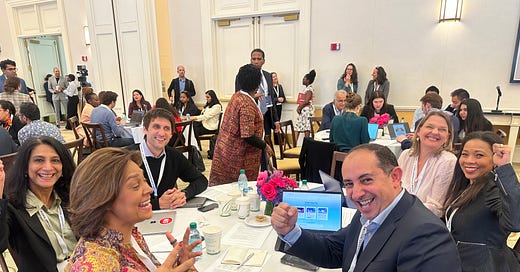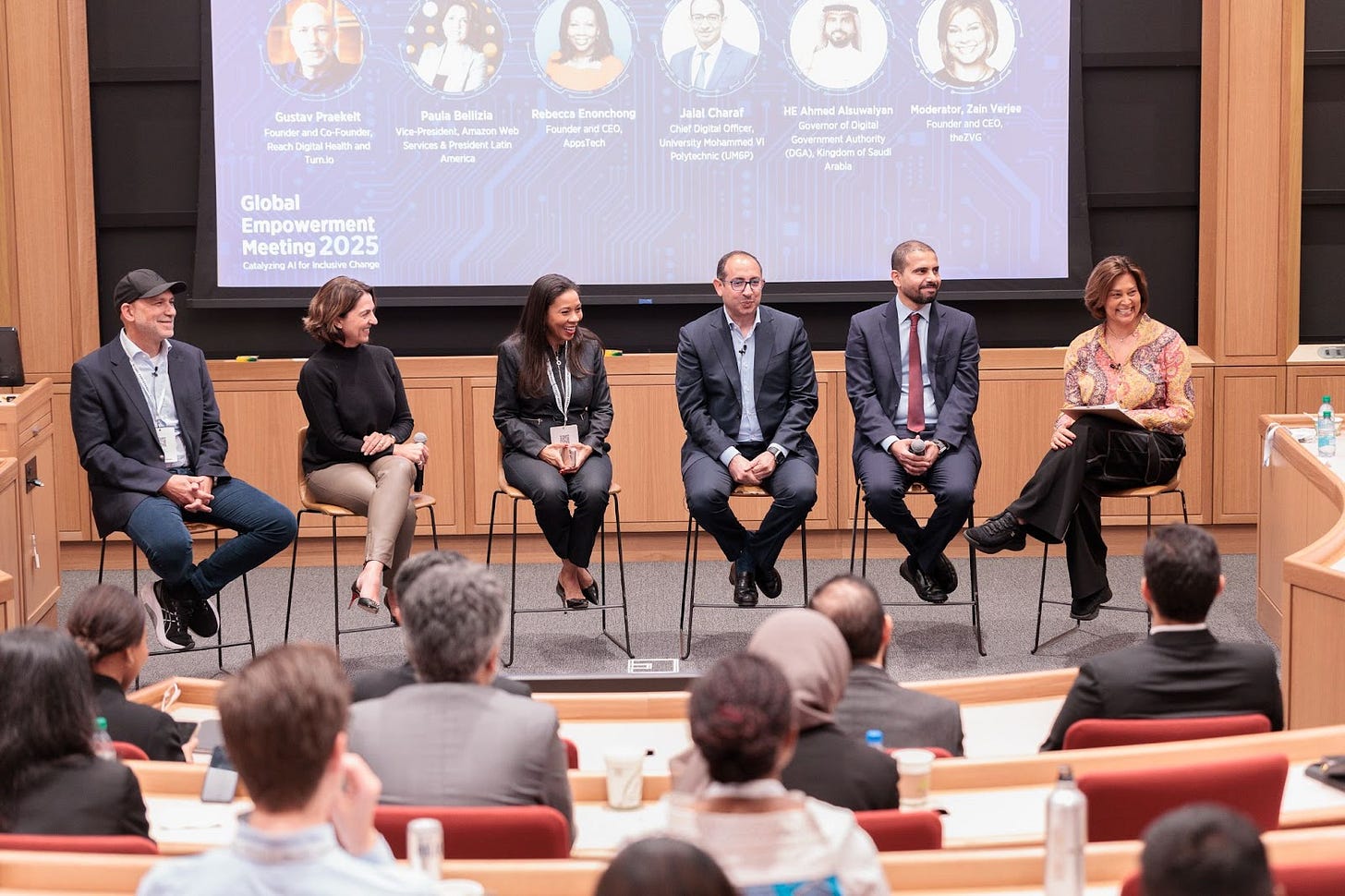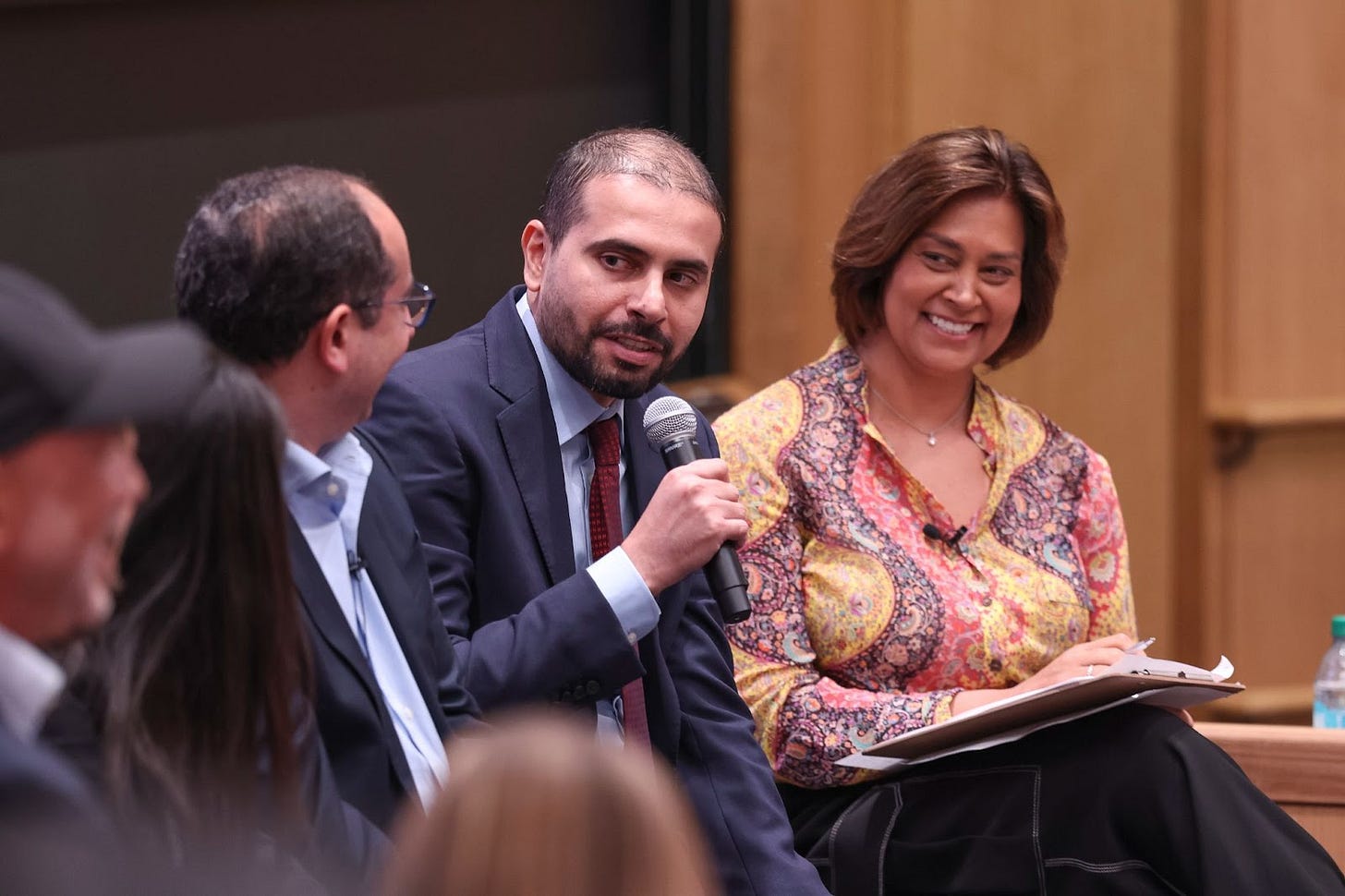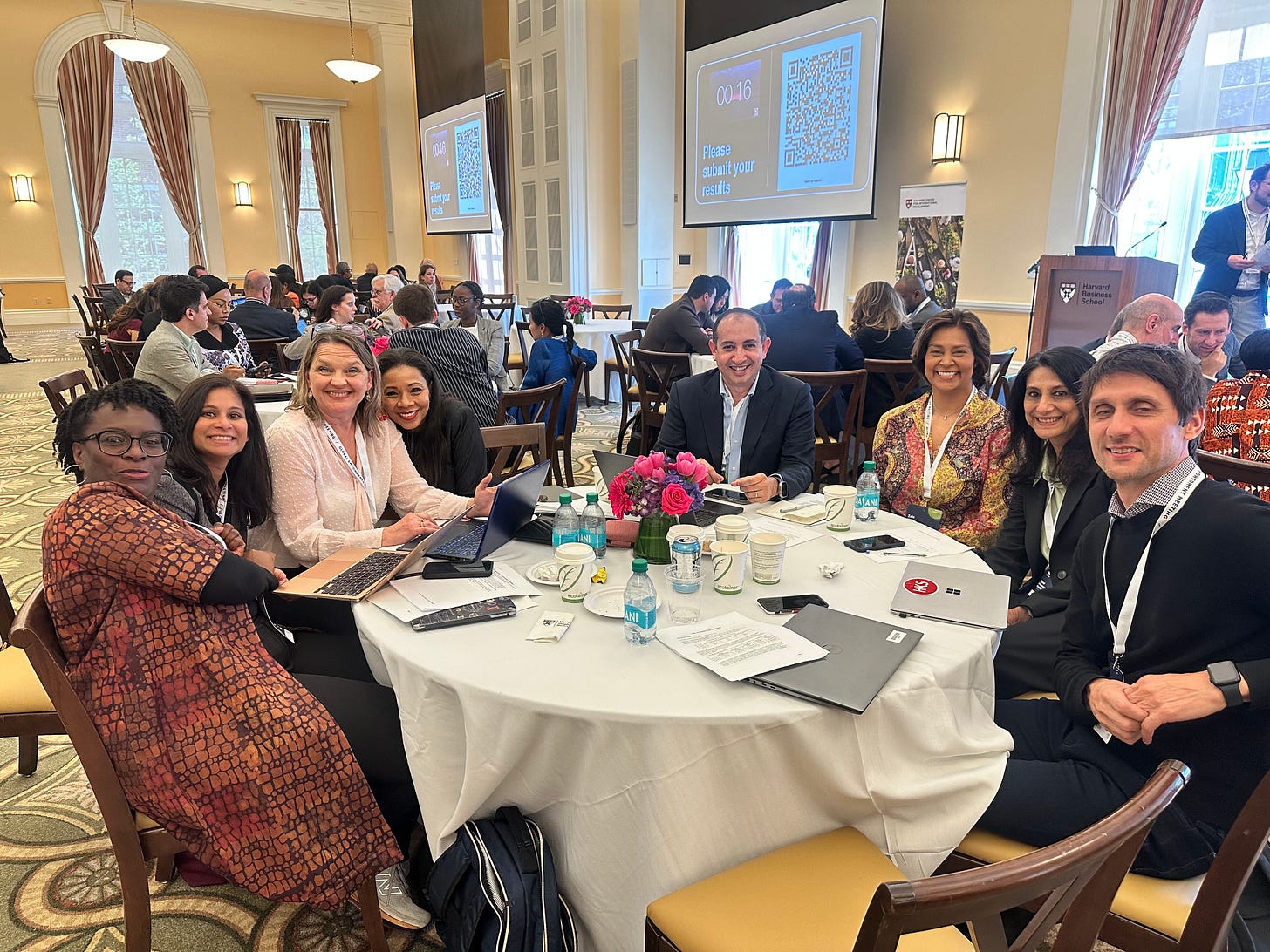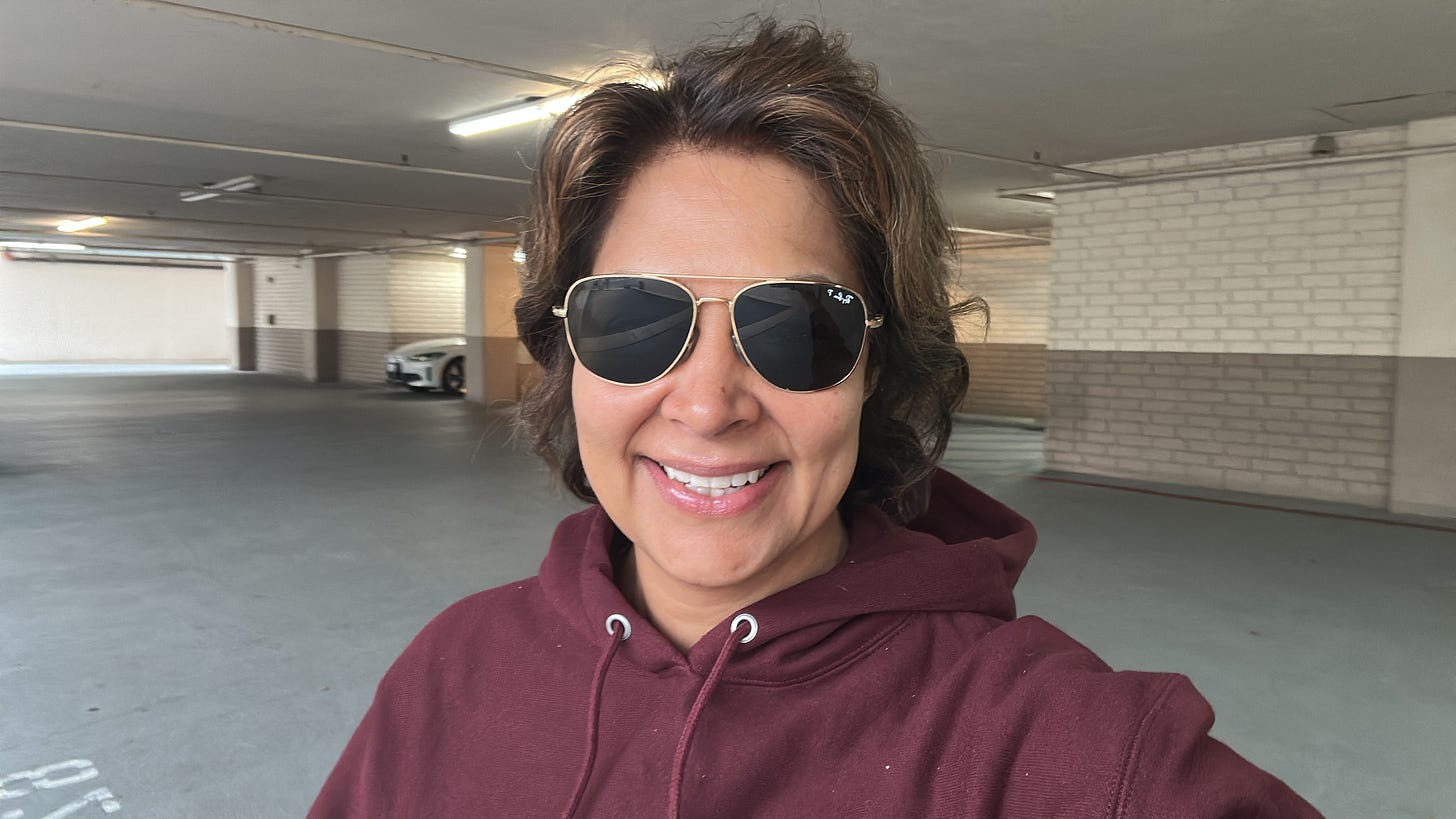Harvard AI Frontiers: The Emerging Economies Edition
Navigating the intersection of artificial intelligence, policy, and innovation across emerging markets
I had a wonderful few days in Boston at Harvard Center for International Development’s annual Global Empowerment Meeting. The theme was catalyzing AI for inclusive change. I learned so much from the policymakers, educators and entrepreneurs who were there. It was not one of the usual run of the mill (sometimes boring) conferences with two panels max and room for practical applications and incubations of Gen AI ideas. I joined the mentorship incubation group, as I think there is a way to build a mentorship network for Africa. I loved all the creative ideas!
Prof.
talks of the knowing-doing gap with Gen AI and we were all in the ‘doing’ bucket at this conference, and at The Rundown Studio. See photo below!The conference was produced in collaboration with the Digital Data Design Institute at Harvard, where I am an Executive Fellow with the Tech for All Lab.
I did my best thinking and prep for the panel by running along the Charles River at 7a. And admiring the rowing teams already out there on the water! Next time I will try get out there on the water.
News Spotlight: Duolingo.
I’ve been practicing my French on it recently. One piece of news that I think its worth pointing out before I give you a few nuggets is this: Duolingo is going to replace contract workers with AI. This is significant because it could be an inflection point for many businesses to follow this model. I got this nice summary from Nathalie Glance.
I’m going to be applying this to our communications team workflow and efforts building Pressmate, a Gen AI comms tool to make press release writing a breeze:
AI will be everywhere in our product
Start with AI for every task
Spend 10% of your time learning
Share what you learn
Avoid overbuilding
Build and experiment carefully
Technical excellence still matters
How AI is reshaping emerging economies
This was my panel topic. We explored how AI developers and deployers are navigating challenges across regions, as well as how innovators are adapting AI to local contexts, addressing market problems, and creating solutions despite wahalas (problems.)
You can watch the full panel here. I’ll be sharing insights from the other excellent panel and speaker takeaways next week too.
Photo Credits: Matt Teuten
The Panel:
His Excellency Ahmed Alsuwaiyan, Governor of the Digital Government Authority in Saudi Arabia
Paula Bellizia, VP of Amazon Web Services and President of Latin America
Jalal Charaf, Chief Digital Officer at University Mohammed VI Polytechnic in Morocco
Rebecca Enonchong, Founder and CEO of AppsTech
Gustav Praekelt, Founder of turn.io
Debate: Government, Government, Government
A good debate emerged around government involvement. some panelists described governments as the primary obstacle to technological progress, while others pointed to government as the essential catalyst.
When asked about the top 3 barriers, Rebecca Enonchong responded: "Government, government, and government." In some African countries, technology companies face hostile environments where officials view the internet with suspicion, frequently threatening shutdowns. This hurts innovation.
Meanwhile, H.E. Ahmed Alsuwaiyan talked about how Saudi Arabia’s approach has been :
Creating certainty through clear policies and strategic direction
Providing financial levers like loans and subsidies
Making government data available as a key asset
He gave an example of their virtual court system. Saudi Arabia reduced case resolution times from 217 days to just 30 days, saving citizens 160 million trips annually and 23 billion Saudi riyals.
Latin America presents yet another model. Paula Bellizia of AWS said Chile has established a National Center for Digital Services and AI that's developing a localized model with experts across the region to ensure cultural relevance. Brazil, meanwhile, just announced $4 billion in government investment for generative AI.
Photo Credits: Matt Teuten
Making AI Work Without Perfect Infrastructure
The most pragmatic perspective came from Jalal Charaf, Chief Digital Officer at University Mohammed VI Polytechnic in Morocco
We cannot afford to recreate what all those rich countries did. We're asking the question, what do we as Africans want? Do we want to solve problems, or do we want to recreate technology that we don't have the means for?
His university has taken AI as a tool to solve existing problems in agriculture, energy, and education. Their approach transforms how professors work: using AI course builders, avatars, and AI tutors to create entirely new educational experiences. With AI implemented correctly, students could possibly learn the equivalent of two years of material in just six weeks.
Gustav Praekelt's mobile-first perspective reminded us that we've already seen one technological revolution, and this could be the basis for the AI revolution. Gustav believes this mobile infrastructure is the foundation to build AI solutions upon, and talked about how his team partnered with WHO to deploy WhatsApp information systems across 15 countries within weeks during COVID-19, reaching over 10 million users.
This contrasts with what Nigeria's Communications Minister Bosun Tijani shared in a recent episode on our Embedded podcast (you can watch that here). “Africa needs to move away from that old narrative of mobile first to investing in fiber optic network," arguing smartphones can't support AI development. Nigeria is expanding national fiber infrastructure from 35,000 to 125,000 kilometers while developing advanced innovation hubs and building African-owned computing power.
The Legal and Cross-Border Challenge
A very serious but often overlooked challenge is legal system variations across Africa. There's a massive divide between Anglophone countries using common law and 17 Francophone nations using OHADA law.
“A company will try to use the same strategy to enter the market in Côte d'Ivoire as they do in Ghana. They are so different," as Rebecca explained. This creates real-world problems – like entrepreneurs hiring lawyers when they actually need notaries, wasting precious resources.
She’s been building an AI platform specifically for OHADA law by creating datasets and enabling small businesses to auto-generate compliant contracts. This approach, deployed through AfriLabs' network of innovation hubs across 53 countries and 200 cities, shows how African-driven AI can solve African-specific problems.
Another dimension to the cross-border challenge is data sharing across private and public sectors.
If a mom goes to a private sector facility or to public sector facility, she's going to go for her ultrasound in her private sector, and she's going to a public sector for the delivery. How are we going to share that?
One idea: make the data belong to the patient or end user, allowing them to carry their information between systems, ministries, and even countries. What do you think about this? Please comment.
What education systems should prioritize going forward.
The panel thinking points toward critical thinking as the essential capability.
"Critical thinking, that's what we should teach." As AI handles cognitive tasks, humans must develop the capacity to step back, rethink assumptions, and ask fundamental questions. "The future is about human-AI collaboration," Jalal Charaf noted.
Another great insight was that: "What we find is that those young people train other young people," creating a multiplier effect. The ‘digital caravan’ approach takes this further, equipping 40-foot containers with tech tools and bringing them to rural communities for weeks at a time, training children as young as 10 years old on emerging technologies.
One encouraging sign of momentum came as Jalal talked about a major new continental initiative: "Africa 100." This ambitious project aims to train 100 million Africans in artificial intelligence with measurable, demonstrated impact. It's exactly the kind of bold, practical initiative that focuses on what Africa needs most — a massive talent pool capable of both creating and implementing AI solutions tailored to local challenges.
Takeaways
What became clear from this conversation is that emerging markets, particularly Africa, face distinct challenges but also unique opportunities to leapfrog in AI development. Here's what I believe needs to happen:
Countries must invest in local AI models and codebase ownership. We cannot rely entirely on off-the-shelf systems built for other contexts. As I've argued before, do not buy off-the-shelf models and platforms as a nation; invest seriously in building your own AI models.
Community-centered approaches to AI must prevail. DeepSeek recently showed we can build competitive AI models for a fraction of the cost ($5.6 million compared to OpenAI's reported $100+ million for GPT-4). This democratizes access and provides a path forward for emerging economies.
We need to bridge the gap between innovation and regulation. The most successful markets will find this balance – providing certainty without stifling creativity.
Subscribe for More Insights from Me
The morning after the day before
If you value this analysis of emerging AI markets, please consider a paid subscription to support our team at The Rundown Studio. For just $8 monthly, you'll be helping our ongoing coverage of AI developments across Africa and emerging markets as we continue building practical tools, like Pressmate for communications teams navigating the AI revolution.
I am building away and would love your support. A Beg O

